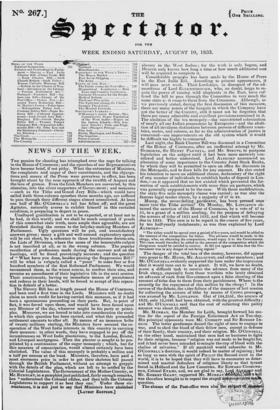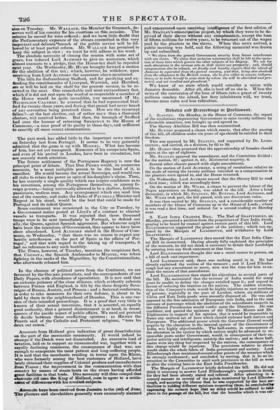NEWS OF THE WEEK.
THE passion for shooting has triumphed over the rage for talking in the House of Commons; and the speeches of our Representatives
have become brief, if not pithy. What the entreaties of Ministers, the complaints and anger of their constituents, and the objurga- tions and sneers of the Press were powerless to effect, has been brought about by the near approach of the twelfth of August and the love of grouse. Even the Irish Members are converted, by this stimulus, into the silent supporters of Government; and measures —such as the Tithe and Grand Jury Bills—which would have
called forth three-column speeches three months ago, are suffered to pass through their different stages almost unmolested. At least one half of Mr. O'CONNELL'S tail has fallen off; and the great Agitator, naturally averse to exhibit himself in this curtailed condition, is preparing to depart in peace.
Unalloyed gratification is not to be expected, or at least not to be'had, in this world; and we shall be much surprised if proofs of this somewhat stale truth, more ample than agreeable, are not furnished during the recess to the holyday-making Members of Parliament. Ugly questions will be put, and unsatisfactory answers given ; many a glib and well-conned explanatory speech will be cut short, by a reference to those troublesome documents, the Lists of Divisions, where the name of the honourable culprit is not inscribed at all, or in the wrong column. The popular recollection of professions made during the canvass and on the hustings, will be found provokingly accurate; and the question of " "What have you done, besides passing the Suppression Bill ?" will be what is vulgarly called a " poser " to some four or five hundred members of the first Reformed Parliament. We would recommend them, as the wisest course, to confess their sins, and promise an amendment of their legislative life in the next session. Their constituents, having no immediate means of punishment and redress in their hands, will be forced to accept of this repara- tion in default of a better.
The Slavery Bill has at length passed the House of Commons, and been read a first time in the Lords. Ministers will no doubt claim as much credit for having carried this measure, as if it had been a spontaneous proceeding on their parts. But, in point of fact, it was forced upon them, and would have been forced upon any Minister of the day, whatever might be his party or princi- ples. Moreover, we are bound to take into consideration the mode in which this question has been carried, and what this pretended settlement amounts to after all. By means of an immense bribe cf twenty millions sterling, the Ministers have secured the co- operation of the West India interests in this country in carrying their measure : in other words, they have engaged to pay off the incumbrances on West India plantations, to the London, Bristol, and Liverpool mortgagees. Then the planter is sought to be pro- pitiated by. a continuance of the sugar monopoly ; which, but for this measure of emancipation, would almost certainly have been -abolished. The value of this monopoly is probably a million and .a half per annum at the least. Ministers, therefore, have paid a most enormous price in order to get their skeleton bill passed through the British Parliament, without an attempt to grapple with the details of the plan, which are left to be settled by the Colonial Legislatures. The Government of the Mother Country, as Mr. B BEXLEY, in a pamphlet just published, fairly enough remarks, has "undermined the Colonial edifice, and then tells the Colonial Legislatures to support it as best they can." Under these eir- =stances, it is not just to say that Ministers have abolished
(LATEST EDITION.] slavery in the West Indies ; for the work is only begun, and Heaven only knows how long a time or how much additional cost will be required to complete it.
Considerable progrriss has been made by the House of Peers in the East India Bill. According to present appearances, it will pass next week. Their Lordships, in disregard of the ad- monitions of Lord ELLENHOROUGH, who, no doubt, longs to re- gain the power of taming wild elephants in the East, have suf- fered the bill to pass through the Committee in very much the same state a it came to them from the Commons. Although, as we previously stated, during the first discussion of this measure, there are many points of the bargain in which the Company have got the better of the Country, still it must not be forgotten that there are many admirable and excellent provisions contained in it. The abolition of the tea monopoly—the unrestricted colonization of nearly all our Indian possessions by Europeans—and the aboli- tion of all invidious distinctions between persons of different coun- tries, castes, and colours, as far as the administration of justice is concerned—are improvements on the old system which it would be difficult too highly to commend. Last night, the Bank Charter Bill was discussed in a Committee of the House of Commons, after an ineffectual attempt by Mr. GISBORNE, Sir HENRY PARNELL, and Mr. STRUTT, to postpone legislation on the subject until it had been more maturely con- sidered and better understood. Lord ALTHORP announced an alteration of some importance to the Country Joint Steck Banks, by which they will be permitted to open an office for discounts in the Metropolis, and to draw bills for any amount. He also stated his intention to move an additional clause, declaratory of the right of any number of individuals to establish banks of deposit in Lon- don,—as it appeared that no law existed which prevented the for- mation of such establishments with more than six partners, which was generally supposed to be the case. With these modifications, the sixty-five mile monopoly clause was carried; as was also the famous legal tender clause, by a majority of 87 to 48. Money, the never-failing epaeificetor, has been pressed once More into the Tithe Service. On Monday, Mr. LITTLETON ob- tained the sanction of the House of Commons, by a vote of 87 to 51, to a grant of a million sterling, for the purpose of defraying the arrears of tithe of 1831 and 1832, and that which will become due in 1833. This sum is to be repaid in the course of five years, by ten half-yearly instalments; as was thus explained by Lord ALTHORP- " The tithes would be spread over a period of five years, and would be added to the amount of the composition for tithes. The advance would be made, to the clergy, who, on obtaining the composition, would repay it to the Government. This sum would therefore be added to the amount of the composition which the clergyman would be entitled to receive. It did not appear to him that the Go- vernment was in any danger of not being repaid."
The danger of the total loss of the money, however, did appear very great to Mr. HUME, Mr. A GLIONBY, and other members ; and Mr. O'CONNELL evidently supported the loan under the impression that it would turn out to be a grant. It will, we have no doubt, prove a difficult task to recover the advance from many of the Irish clergy, especially from those worthies who lately obtained an advance of cash from Government upon a false showing of the amount of tithe due to them from their parishioners. Where is the security for the repayment of this million by the clergy? In the course of the debate, the utter failure of the measure of last session for collecting the arrears of tithe by means of Crown processes, was avowed by Mr. LITTLETON. Out of 104,2581., the arrears of 1832, only 12,5001. had been obtained, with the greatest difficulty; and Mr. O'CONNELL said that the cost of collecting this paltry amount was about 25,0001.
Mr. MURRAY, the Member for Leith, brought forward his mo- tion for the repeal of the Foreign Enlistment Act on Tuesday. His principal opponents were Mr. CORBETT and Sir ROBERT IN- GLIS. The latter gentleman denied the right of men to engage in war, and to shed the blood of their fellow men, except in defence of their family, their country, and their religion. Mr. O'CONNELL, on the other hand, maintained that men had no business to fight for their religion, because " religion was not made to be fought for, and it had never been intended to mingle the cup of blood with the chalice of salvation." If all mankind would subscribe to Mr. O'Coeeeee's doctrine, it would indeed be matter of rejoicing; but as long as men with the spirit of PHILIP the Second exist in the world, it is to be hoped that they will have to encounter as deter- mined and martial defenders of religious liberty as that tyrant found in Holland and the Low Countries. Sir EDWARD CODRING.. TON, Colonel EVANS, and, we are glad to say, 1,2A AID P and. Mr. ROBERT GRANT, supported Mr. MueeteeltatTel504. 11 was therefore brought in to repeal the stupiraft4nOrie.:, question. The abuses of the Postoffiee were aid:sti ,ion on Tuesday. Mr. WALLACE, the Member for Greenock, de- serves well of his country for his exertions on this occasion. The returns he moved for were ordered ; and we have little doubt that the Parliamentary exposure of the abuses committed in this very important and delicateibbranch of the public service will be fol- lowed by at least partial reform. Mr. WALLACE has promised to keep the subject in view ; we trust he will adhere to his word. The absolute necessity of closing the session with some act of grace, has induced Lord ALTHORP to give an assurance, which almost amounts to a pledge, that the House-tax shall be repealed siert year. On Wednesday, Mr. HUME brought forward a motion far the abolition of this tax ; which, however, he withdrew, upon receiving from Lord ALTHORP the assurance above-mentioned. The bills for disfranchising Stafford, and for purifying and ex- thnding the constituencies of Liverpool, Warwick, and Hertford, sae or will be laid on the shelf for the present session, to be re- ntwed in the next. One remarkable and most extraordinary fact, which if it did not rest upon the word of so respectable a member of the House would be quite incredible, was mentioned 14 Mr. NICHOLSON CALVERT; he averred that he had represented Staf- ford for twenty-three years, and during that period had never heard of any corruption being practised there. How are the incorrupt fallen!—at the last election, out of rather more than a thousand electors, 852 received bribes. But then, the borough of Stafford _had once the honour of returning SHERIDAN to the House of Commons,—a sure proof of its purity in those days, and sufficient to sanctify all more recent abominations.

























